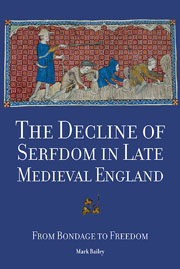Appendix: List of original sources used in this study
Published online by Cambridge University Press: 05 March 2014
Summary
The classification of each manor as large, medium or small follows the definitions established in Chapter Five (p. 97). The range of years given for court rolls is continuous whenever court sessions survive from two consecutive years: hence a statement ‘courts 1350–76, 1379–85, 1450’ means that there is no gap in extant court sessions greater than two consecutive years in the periods 1350 to 1376, and 1379 to 1385; no courts survive from 1377 or 1378; and none survive after 1386, with the single exception of one or more courts from 1450.
Te approximate number of surviving court sessions and accounts is a reliable and accurate indication of those which are extant and which are capable of yielding usable information about villeinage for that manor. An exact enumeration is meaningless for three reasons. First, an account may have survived, but upon inspection it proved to be partial, damaged or a duplicate. Second, some record of a court session may have survived, but it too proved to be damaged, illegible or incomplete. Third, the enumeration of leet courts is problematic for the purposes of this study. Not all manors in the sample held leets. Others held separate leets earlier in the period, but later merged the leet with the manorial court baron due to dwindling business. On some manors the leet court contained no business relating to the management of villeinage.
- Type
- Chapter
- Information
- The Decline of Serfdom in Late Medieval EnglandFrom Bondage to Freedom, pp. 339 - 344Publisher: Boydell & BrewerPrint publication year: 2014



